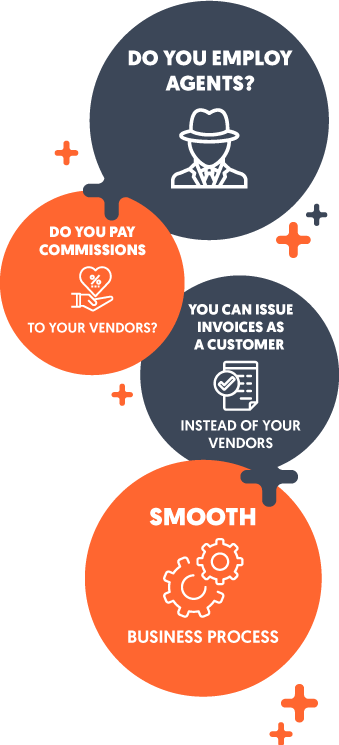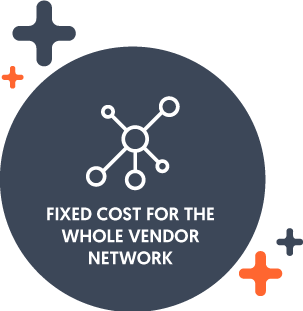Third-party invoicing and self-invoicing
- Do you have many vendors? Is their invoicing chaotic?
- Don’t the invoices include what they should?
- Are they different from the way set out in the contract?
- Don’t they include exactly the same amounts that have been accounted?
- Do they use wrong VAT rates sometimes?
- Not to mention the delivery dates in the invoices…?
If you are struggling with these problems, it is worth reading on, because self-invoicing and third-party invoicing were probably invented for you.
Third-party invoicing and self-invoicing (or self-billing) go hand in hand. In both cases, it is not the vendor who issues the invoice, but a third party (third-party invoicing) or the customer itself (self-invoicing). Self-invoicing is a specific case of third-party invoicing. We show you the difference between them below:

If you are less visual-minded, here are three definitions 🙂
Traditional invoicing: the vendor issues the invoice to the customer.
Self-invoicing: if the vendor gives his customer a third-party invoicing authorization, so that the invoice is issued by the customer instead of the vendor. In such cases, the invoice must indicate: „önszámlázás” (self-invoicing).”.
Third-party invoicing: the invoice is issued to the customer by a third party appointed by the vendor.
Did you know?
All kinds of self-invoicing are considered to be third-party invoicing, but not all kinds of third-party invoicing are considered to be self-invoicing! 🙂

We recommend them to
Enterprises who:
employ agents and pay them commissions on a monthly basis (the amount of which is monitored by the enterprise),
who have too many vendors, and the invoices issued to the company are filled in incorrectly too many times.
With areas of activity such as:
food delivery
transport
ticketing companies
Advantages
The customer can be sure that the invoice includes items in accordance with the conditions defined by the contract with the vendor
- In the case of self-invoicing, the invoice is immediately with the customer, it does not have to wait for the vendor
- Smoother and faster business processes
- Less administration with subcontractors
- Vendors receive payments sooner
With Számlázz.hu, you can implement third-party invoicing (including self-invoicing) easily and quickly, so you as a customer can issue invoices instead of your vendors.
Important: Enter into a written contract with your vendor
As the invoice is not issued by the person liable for the payment of VAT in the case of third-party invoicing or self-invoicing, a written contract is definitely required. To help you with that, we created a sample contract which you can see here in Hungarian.

Costs
The monthly fee of the service is 31 750 HUF (25 000 HUF+VAT) which you only have to pay subsequently.
The amount of the monthly fee is independent of the number of vendors your business invoices on behalf of. This means that you can manage the billing of your entire vendor network with the above fixed cost.
Other variable costs incurring: in the case of third-party invoicing or self-invoicing, the costs of both the e-invoice and the Számla Agent (Invoice Agent) service (if you also use it) shall be borne by the authorized party. Therefore, as the authorized party, you can also issue e-invoices in the Számlázz.hu account of the authorizer if it is using the #free package.
Frequently asked questions
Yes. It is also possible for the authorized party to automatically create the authorizer’s invoicing account (automatic registration). A specialized Account Agent system call is used for this which is detailed here. Please contact us for more information.
Do you have any question?

